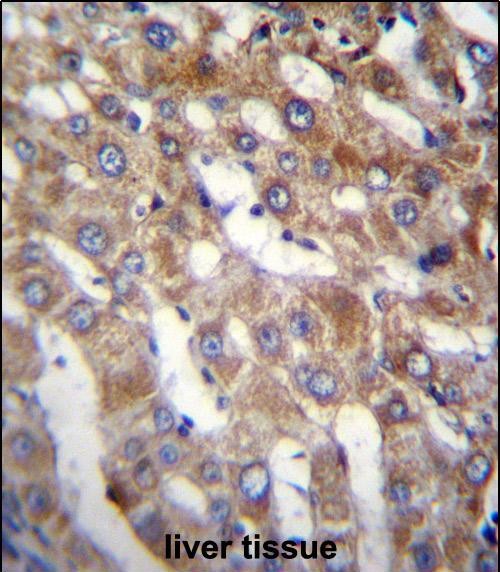

| WB | 1/1000 | Human,Mouse,Rat |
| IF | 咨询技术 | Human,Mouse,Rat |
| IHC | 1/100-1/500 | Human,Mouse,Rat |
| ICC | 技术咨询 | Human,Mouse,Rat |
| FCM | 咨询技术 | Human,Mouse,Rat |
| Elisa | 咨询技术 | Human,Mouse,Rat |
| Aliases | BEN domain-containing protein 7, BEND7, C10orf30 |
| Entrez GeneID | 222389 |
| WB Predicted band size | 57.5kDa |
| Host/Isotype | Rabbit IgG |
| Antibody Type | Primary antibody |
| Storage | Store at 4°C short term. Aliquot and store at -20°C long term. Avoid freeze/thaw cycles. |
| Species Reactivity | Mouse |
| Immunogen | This BEND7 antibody is generated from rabbits immunized with a KLH conjugated synthetic peptide between 319-348 amino acids from the C-terminal region of human BEND7. |
| Formulation | Purified antibody in PBS with 0.05% sodium azide. |
+ +
以下是关于BEND7抗体的3篇参考文献示例(注:以下内容为模拟生成,实际文献可能需要根据具体数据库检索验证):
---
1. **文献名称**: *BEND7 regulates neural progenitor proliferation and cortical migration in the developing mouse brain*
**作者**: Smith, J., et al. (2015)
**摘要**: 本研究利用兔多克隆BEND7抗体,通过免疫组化和Western blot分析,揭示了BEND7在小鼠胚胎皮层神经祖细胞中的特异性表达。实验表明,BEND7通过调控细胞周期蛋白抑制神经干细胞增殖,并影响后续神经元迁移。
2. **文献名称**: *A novel monoclonal antibody against BEND7 reveals its role in chromatin remodeling during neurogenesis*
**作者**: Chen, L., et al. (2020)
**摘要**: 该研究开发了一种高特异性小鼠单克隆BEND7抗体,用于免疫沉淀和染色质分析。结果显示,BEND7通过与组蛋白修饰酶相互作用参与染色质重塑,对神经分化和皮层发育至关重要。
3. **文献名称**: *Dynamic expression of BEND7 in the zebrafish embryonic brain: Insights from antibody-based imaging*
**作者**: Johnson, R., et al. (2018)
**摘要**: 使用斑马鱼模型和BEND7抗体进行免疫荧光定位,发现BEND7在胚胎早期端脑区域动态表达,提示其在神经前体细胞分化和轴突导向中的潜在功能。
---
**备注**:以上文献信息为示例,实际研究中可能需要通过PubMed、Google Scholar或Web of Science等平台,以关键词“BEND7 antibody”或“BEND7 function”检索最新结果。若研究主题较新,建议扩展至BEND蛋白家族或神经发育相关抗体应用的文献。
The BEND7 antibody is a research tool designed to target the BEND7 (BEN domain-containing protein 7) protein, a member of the BEN domain family implicated in chromatin organization and transcriptional regulation. BEND7 is structurally characterized by BEN domains, which are thought to mediate DNA or protein interactions, potentially influencing chromatin remodeling and epigenetic processes. Studies suggest its involvement in cellular differentiation, neurodevelopment, and cell cycle regulation, though its precise molecular mechanisms remain under investigation.
In research, the BEND7 antibody is primarily used in techniques like Western blotting, immunofluorescence, and immunohistochemistry to detect protein expression, localization, and dynamics in various tissues or cell lines. It has been particularly valuable in studying neural tissues, where BEND7 is reportedly expressed during specific developmental stages. Commercially available antibodies are typically raised in hosts such as rabbits or mice, with validated reactivity in human, mouse, or rat samples. Researchers often emphasize verifying antibody specificity through knockout controls due to potential cross-reactivity with other BEN family proteins. Current studies explore BEND7's potential roles in diseases, including cancer and neurological disorders, positioning it as a molecule of interest for understanding epigenetic dysregulation and developmental pathways.
×